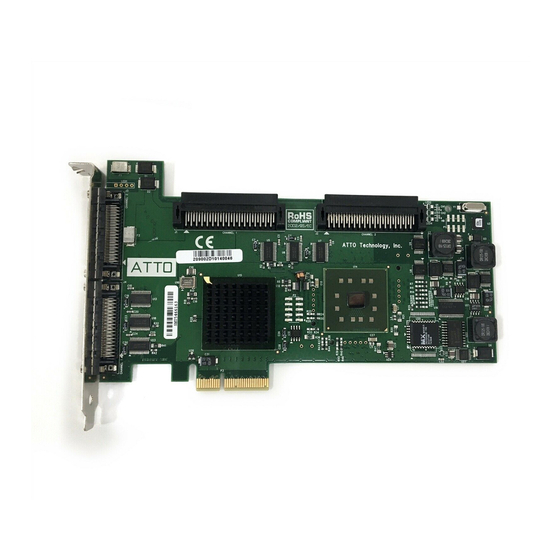ATTO Technology ExpressPCI UL5D LP 문제 해결 매뉴얼 - 페이지 7
{카테고리_이름} ATTO Technology ExpressPCI UL5D LP에 대한 문제 해결 매뉴얼을 온라인으로 검색하거나 PDF를 다운로드하세요. ATTO Technology ExpressPCI UL5D LP 12 페이지. Single channel ultra320 scsi, pci-x host adapter dual channel ultra320 scsi, pci-x host adapter dual channel ultra320 scsi, pci express host adapter dual channel ultra320 scsi, low-profile pcie host adapter
ATTO Technology ExpressPCI UL5D LP에 대해서도 마찬가지입니다: 기술 사양 (2 페이지), 호환성 차트 (1 페이지), 설치 및 운영 매뉴얼 (19 페이지)

user is informed that the values shown are defaults. These defaults must be
committed in order to correct the state of the NVRAM.
o An error occurred updating the NVRAM - This message occurs during a
committal of NVRAM to the card. If the driver is unable to put the new
settings on the card, this message is displayed to the user and no changes
are made to the card.
o This is not a flash file, or it is corrupt – Checks are performed to assure the
proper file has been selected for flashing to the specific model of host
adapter.
B.) Linux Operating Systems
The host adapter driver was loaded properly and everything was working, but
the devices do not show up after the computer was rebooted. On some Red Hat
Linux distributions, the driver may not automatically load when the system is
booted.
To enable driver autoload in Red Hat 4 Add the following line to
/etc/modprobe.conf after installing the driver:
alias scsi_hostadapterX express2
To enable driver autoload in Red Hat 3 Add the following line to /etc/rc.modules
after installing the driver:
modprobe express2
(Note: you may need to create /etc/rc.modules and make it executable with
'chmod +x /etc/rc.modules')
The host adapter can detect the target device at LUN 0 but not the devices at
LUN 1 or higher in Red Hat Linux version 3 with kernel 2.4.
When using version 2.4 of the Linux kernel (eg. Red Hat 3), devices on LUN 1 or
higher may not be detected automatically when the driver is loaded. This is a
known issue with the 2.4 kernel. To manually detect such devices, issue the
following command:
$ echo "scsi add-single-device <h> <b> <t> <l>" > /proc/scsi/scsi
Where <h> is the host, <b> is the bus (always 0 for ATTO drivers), <t> is the
target, and <l> is the LUN. You can confirm that the device has been detected
by checking for it in /proc/scsi/scsi.
Page 7 of 12
Where X is the next available #.
Atto Technology, Inc.
January 19, 2007
